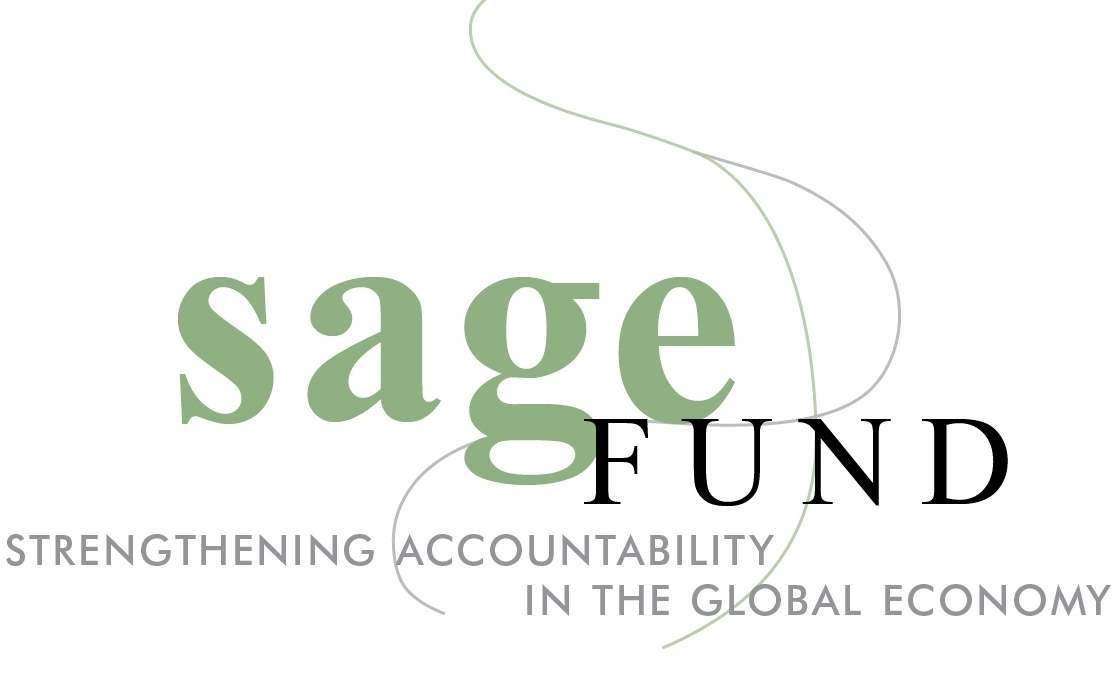grant round
climate justice and corporate accountability
Beginning in 2022, the SAGE Fund supported a thematic round of grants on climate justice and corporate accountability. The selection of this theme reflects its evolution from an emerging issue to a central focus in the human rights field. Civil society has reached a tipping point: there is now a shared priority and awareness within the human rights movement of the intertwined impacts of the climate crisis and the urgent need to tackle the accountability gaps that drive it, particularly around economic actors. The SAGE Fund sees an opportunity to contribute to sharpening the focus on providing remedy for affected communities and climate impacts; strengthening climate solutions by ensuring they don’t recreate harms from the current extractive model; and advancing accountability in models for a just transition.
With this thematic cohort, SAGE seeks to explore ways to hold corporations accountable for their contribution to causing climate change and the human rights impacts of their proposed climate solutions. This duality allows the cohort of projects to explore strategies for holding corporations accountable for their emissions and extraction that have contributed to climate change, including the harmful localized impacts on communities affected by site-specific investments. At the same time, it will expose and hold corporations accountable for their harmful human rights impacts generated by the “false solutions” advanced through green development initiatives or by the same extractive model applied to renewables or transition minerals.
grant round locations
The theme explores ways to advance climate justice by targeting corporate practice and exposing accountability gaps that undermine a just transition while ensuring remedy and rights protection for Indigenous and local communities in the process. The projects include:
PROTECTING INDIGENOUS RIGHTS IN THE CARBON MARKET
The project will support the Kichwa people in the Peruvian Amazon to assert their rights in the context of large-scale carbon trading and exclusionary protected areas imposed on their territories, through a multilayer strategy to hold accountable the state and corporate actors involved in and profiting from the sale of the credits, creating a replicable model for the governance of carbon trading that respects indigenous peoples’ rights and contributions to climate protection.
organizations
Instituto de Defensa Legal (IDL), idl.org.pe, Peru
Due Process of Law Foundation (DPLF), dplf.org, USA
Forest Peoples Programme (FPP), forestpeoples.org, UK
UNITING COMMUNITIES AGAINST FALSE SOLUTIONS TO CLIMATE CHANGE
The project will expose the "false solutions" to climate change advanced by corporations and promote just transition models through increased coordination among affected communities, movements and networks in Latin America and the Caribbean, and the development of an online map of projects that perpetuate the fossil fuel model and fail to address the structural causes of climate change.
Organizations
Colectivo Viento Sur, colectivovientosur.org, Chile
Corporate Accountability, corporateaccountability.org, USA
Global Campaign to Demand Climate Justice (DCJ), demandclimatejustice.org, Global
Plataforma Latinoamericana y del Caribe por la Justicia Climática, JusticiaClimaticaLA/?locale=es_LA, Regional
SECURING BENEFITS AND PROTECTING RIGHTS IN A NEW LITHIUM HOTSPOT
The project aims to set a precedent that African communities affected by the extraction of minerals for the energy transition share in the benefits, by influencing the development of DRC’s first large-scale lithium mine through the negotiation of a legally required benefit-sharing agreement with the company and the participatory documentation of its human rights and gender impacts, informing national and regional plans for increased investment and development in the sector.
ORGANIZATIONS
African Resources Watch (AfreWatch), afrewatch.org, Democratic Republic of Congo
The Oil and Mines Governance Center, Democratic Republic of Congo
BUILDING A GLOBAL COALITION TO TRANSFORM THE STEEL SECTOR AND ADDRESS ITS HUMAN RIGHTS AND CLIMATE IMPACTS
The project will seed a newly formed transnational coalition that aims to transform the steel sector, beginning with ArcelorMittal and Ternium, by developing and launching a strategy to decarbonize their operations in the Global South, while holding their subsidiaries accountable for local human rights and environmental impacts in South Africa, Mexico, and Brazil, and Liberia.
ORGANIZATIONS
Centre for Environmental Rights (CER), cer.org.za, South Africa
Vaal Environmental Justice Alliance (VEJA), veja.org.za, South Africa
Instituto Políticas Alternativas para o Cone Sul (PACS), pacs.org.br, Brazil
Tsikini, tsikini.org, Mexico
Green Advocates, greenadvocates.org, Liberia
Steelwatch, USA
Environmental Defender Law Center (EDLC), edlc.org, USA
Instituto Internacional de Derecho y Medio Ambiente (IIDMA), iidma.org, Spain
PROTECTING INDIGENOUS RIGHTS IN LAND-USE PLANNING TO AVOID DEFORESTATION FROM AGRIBUSINESS
The project will ensure protections for Indigenous and local communities in a new and scaled-up approach to prevent deforestation by agribusiness corporations in tropical countries, by revising the methodology of a key land-use planning tool with lessons from Indonesia, before it is rolled out through certification systems and other mechanisms globally.
ORGANIZATIONS
Yayasan Masyarakat Kehutanan Lestari (YMKL), Indonesia
AMAN Kalbar, kalbar.aman.or.id, Indonesia
Palangkaraya Ecological and Human Rights Studies (PROGRESS), Indonesia
Perkumpulan Bahtera Alam, Indonesia
Yayasan Rumpun Bambu-Aceh, Indonesia
Forest Peoples Programme, forestpeoples.org, UK
Challenging ECA Funding for LNG Gas Projects – Mozambique
The project aims to halt financing for LNG projects in Mozambique that contribute to climate change and conflict in the region, incur significant human rights impacts, and at the same time, undermine commitments to phase out support for fossil fuels. The partners will undertake a comprehensive legal and advocacy campaign targeting European Export Credit Agencies, corporations, governments and commercial banks and seek remedy for affected communities in Cabo Delgado for the livelihood impacts caused by these projects.
ORGANIZATIONS
Justiça Ambiental (JA!, FoE Mozambique), ja4change.org, Mozambique
Friends of the Earth Europe (FoEE), friendsoftheearth.eu, Belgium
ReCommon, recommon.org/en, Italy
Les Amis de la Terre (FoE France), amisdelaterre.org, France
PHOTOS (from left): Assembly of the Latin American and Caribbean Platform for Climate Justice; Brazilian steel plant courtesy of Instituto PACS; Puerto Franco Community Members by Matias Perez Ojeda del Arco/FPP.







